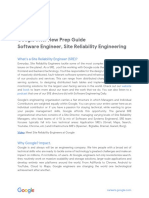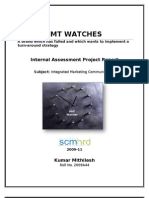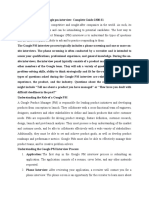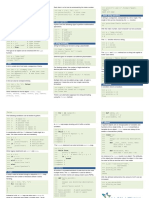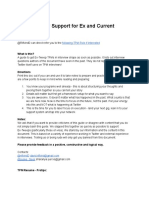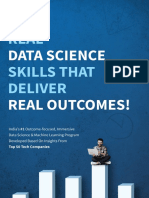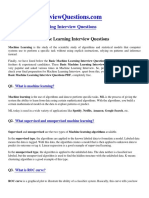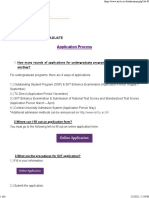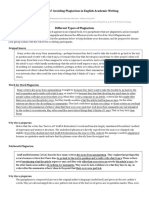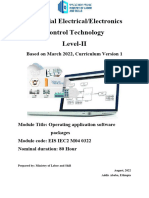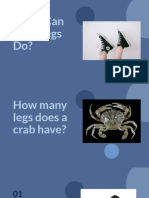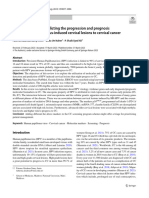(Google Interview Prep Guide) Data Science Lead
Uploaded by
Ankit Agarwal(Google Interview Prep Guide) Data Science Lead
Uploaded by
Ankit AgarwalGoogle Interview Prep Guide
Data Scientist Technical Lead
What is a Data Scientist Technical Lead?
Data Scientists work all across the organization to help shape Google's business and technical
strategies by processing, analyzing and interpreting huge data sets. Using analytical excellence
and statistical methods, you mine through data to identify opportunities for Google and our
clients to operate more efficiently, from enhancing advertising efficacy to network
infrastructure optimization to studying user behavior.
As a Technical Lead, you do more than just crunch the numbers. You work with Engineers,
Product Managers, Sales Associates and Marketing teams to adjust Google's practices
according to your findings. Identifying the problem is only half the job; you also figure out the
solution. If in a leadership role, you’ll manage a team of analysts, plan project goals and lead the
overall strategy for your group. You are a recognized authority in your functional area and
develop, organize and launch projects that span engineering and analysis.
Getting ready for your interviews
Your interviewer will be assessing you based on four attributes using a mix of behavioral and
hypothetical questions:
Role-related (Statistical & Programming) knowledge - We’re interested in how your
individual strengths combine with your experience to drive impact. We don’t just look for how
you can contribute today, but how you can grow into different roles—including ones that
haven’t even been invented yet.
General cognitive ability (Data Intuition) - We ask open-ended questions to learn how you
approach and solve problems. And there’s no one right answer—your ability to explain your
thought process and how you use data to inform decisions is what’s most important.
Leadership - Be prepared to discuss how you have used your communication and
decision-making skills to mobilize others. This might be by stepping up to a leadership role at
work or with an organization, or by helping a team succeed even when you weren’t officially
the leader.
Googleyness - Share how you work individually and on a team, how you help others, how you
navigate ambiguity, and how you push yourself to grow outside of your comfort zone.
careers.google.com
Interview Format: 2 Rounds
Your Interviews: In total, you will have 5 interviews. All interviews will have a main focus, but
there could be exposure to other focus areas in each interview as well. The main focus areas
for your interviews are listed below. They are all one-on-one 45 minute video chats over
Google Meet and you will have a Google Doc shared with the interviewer that you can use
during each interview.
It’s very important to let your interviewer know if they ask you a question that you’ve already
been asked. Interviewer feedback from repeated questions is unhelpful and could require us to
schedule a follow up interview.
First round interviews:
● Statistical Knowledge
● Data Analysis & Intuition
Second Round interviews:
● Statistical Knowledge, Data Analysis & Intuition
● Statistical Programming OR Statistical Knowledge (role dependent) & Data Intuition
● Googleyness + Leadership
careers.google.com
Deep Dive: Evaluation Areas
Statistical Knowledge: The most important focus of your interviews will be on Applied
Statistics. You should dedicate your studies to statistical methods and theories, as this will be
the backbone of your evaluation. The interviewer might give you a scenario and say “what
method is being applied here?” You are not expected to recite definitions, but they’ll want to
see that you can identify what method is appropriate and why you would choose it. Some
questions could be academic in nature and some will require you to apply your stats
knowledge to real world problems. These may be problems that we see at Google or they may
be situational-based stats questions that aren’t related to the tech industry.
Be ready for:
● Basic concepts: Probability theory (conditional probability, expectation, variance),
Hypothesis testing (i.e. binomial proportions), Regression (linear, logistic), Resampling
methods (Bootstrap, cross-validation), Predictive Modeling
● Advanced concepts (less common): Bayesian and related methods, Clustering
(supervised, unsupervised), Time series analysis, Experimental design, Survival analysis,
Convex optimization, Monte Carlo methods, Decision trees
Examples of textbook statistics questions:
● Probability theory: “What’s the distribution of a coin toss?”
● Predictive Modeling: “Here is an example of a data set and here is a question that you’re
interested in answering. What statistical model would you fit to that data to answer the
question?”
● Hypothesis testing: “How would you compute a P Value for the following question?”
(The answer could go a few ways, math or programming)
careers.google.com
Data Analysis & Intuition: This interview will cover your problem solving skills. The interviewer
will want to understand how you form a solution when you’re not given a lot of information.
● They’ll assess whether you are able to turn a business question into data analysis.
Interviewers will be looking to see if you can provide a meaningful recommendation to
a business case study based on your data-driven findings.
● It is critical to clarify every question before embarking on an answer. The interviewer is
not looking for a golden response, and in many cases there is no one right answer. This
is about evaluating your thought process when problem solving. Be thoughtful. Don’t
feel the need to rush into answering the question, and if you want to talk it out then feel
free to do so. Can you critique your own response when prompted to?
● We want to make sure there’s a logical approach. The interviewers’ assessment of you
will begin with how you clarify a question before you answer, because solving within
ambiguity is key at Google.
● Be sure to clearly state your assumptions (i.e. “We don’t have this data, but I’m
assuming XYZ”)
Example of an open-ended, hypothetical question requiring you to apply your knowledge of
stats to solve a real world problem:
● “We offered users 10% off of all their purchases at the Google Play store last weekend.
How can we determine if this promotion was successful or not?"
○ That’s all the information you would get upfront. It would be up to you to clarify
and ask: “Did every user receive this offer globally, or did we select certain
users? And if so - how did we segment this selection? Do I have purchase
history trends for previous weekends?” The interviewer is looking for you to
clarify and that’s when their assessment begins.
Statistical Programming: You can choose to use Python or R for this interview. This portion of
your interview will cover advanced statistical coding and modeling. This is not a SWE interview,
and there will not be questions over complex coding, and no heavy algorithms.
● The interviewer will defer to your programming language of choice. Our Data Scientists
predominantly use R programming or Python, so if it’s on your resume they will likely
ask for a sample in either of these languages (they’re fair game).
● You will be using shared Google Docs to type your answers to the coding interviews
(and the other technical interviews). Your code will not be run on any external programs
● Expect that coding / scripting will be done from scratch via the Doc for your interview.
You are not guaranteed access to external libraries, though your interviewer may
choose to allow this depending on the questions they ask.
careers.google.com
● As you solve a problem, talk through your logic. Even if your code / syntax isn’t perfect,
verbalizing your thought process can sometimes be just as valuable.
Example Programming Question:
● "I have 2 data sets that I need to combine for a specific purpose. How do I do that in R
or Python?" (combining data sets or aggregating data sets in a certain way,
manipulation and processing, statistical modeling)
Communication: Walk your interviewer through the rationale on how you came up with your
answers in a clear and concise manner. State your assumptions and be specific with your
solutions. The interviewer will also be assessing whether or not you can explain a really
technical concept to a non-technical audience. It’s ok to pause briefly during your interviews. If
you need more time, let the interviewer know that you’re thinking through it so that they know
where you are.
Google looks for people who go above and beyond the usual duties to create something great.
If you’re passionate about Google, show us by asking questions and demonstrating how you
could contribute to our culture of creativity and collaboration.
Googleyness & Leadership: This interviewer will ask behavioral and hypothetical questions to
assess your Googleyness & Leadership. While it should be mostly non-technical, we can’t rule
out questions regarding your Technical Leadership ability.
● Leadership: Be prepared to discuss how you have used your communication and
decision-making skills to mobilize others. This might be by stepping up to a leadership
role at work or with an organization, or by helping a team succeed even when you
weren’t officially the leader. You may also be asked to describe how you manage
different types of performers, navigate conflict-resolution, focus on career mentorship
and development, etc.
● Googleyness: They will evaluate how you work individually and on a team, how you help
others, how you navigate ambiguity, and how you push yourself to grow outside of your
comfort zone.
Example of a Behavioral Question:
● "Tell me about a time when you failed to meet a deadline. What did you fail to do? What
did you learn?" Things to consider for your answer:
○ The root cause
○ How you applied what you learned in future projects
careers.google.com
Other General Tips
● Remember that the size of data we work with everyday at Google is rare. Interviewers
want to know that you’re comfortable with large scale data complexity.
● At Google it’s all about the user. Keeping user experience at the forefront of your
solutions will work to your advantage. Think about our products and how we analyze
and use user data, how we measure user satisfaction, efficiency, predictability, etc…
● Pretend you already work here! Treat your interviews like you are in a brainstorming
session. Think of it as having an intellectual conversation with a colleague instead of a
formal evaluation. We aren’t looking for one perfect answer, but how you diagnose a
problem and think about solving it.
● Try to overcome any nerves. Be mentally prepared to recover if you get stumped, the
confidence and Googleyness will go a long way.
careers.google.com
Additional Resources
About us
About Google
Our story
Life at Google
Google Products
How we hire
Connect with a Googler
Interested in learning more about what it’s like to work at Google? Let your recruiting partner
know and they’ll set up a phone call with a Googler in your field of expertise for an insider's
perspective on everything from technology to culture, and more. This call is not an interview, a
coaching call or a fit call, but rather an informal 30-minute conversation with volunteers who
are not part of the hiring process. Learn more.
Candidate Accommodations
It’s important to us to create an accessible, inclusive workplace for everyone. Please complete
this form if you need any accommodations for your interviews, like a sign language interpreter,
specialized equipment, or a lactation break. Our candidate accommodations team will then
connect with you to confidentially discuss your options.
careers.google.com
You might also like
- Rippling - Interview Preparation Document (SR Software Engineer)No ratings yetRippling - Interview Preparation Document (SR Software Engineer)3 pages
- Accenture Data Scientist Interview QuestionsNo ratings yetAccenture Data Scientist Interview Questions13 pages
- Kenny-230717-Google Data Scientist GuideNo ratings yetKenny-230717-Google Data Scientist Guide8 pages
- Google Interview Prep Guide - Site Reliability Engineer (SRE)No ratings yetGoogle Interview Prep Guide - Site Reliability Engineer (SRE)6 pages
- [FREE PDF sample] Cracking the PM Interview How to Land a Product Manager Job in Technology 1st Edition Gayle Laakmann Mcdowell Jackie Bavaro ebooks100% (1)[FREE PDF sample] Cracking the PM Interview How to Land a Product Manager Job in Technology 1st Edition Gayle Laakmann Mcdowell Jackie Bavaro ebooks40 pages
- (Pmacclerator - Io) 50 FAANG Interview QuestionsNo ratings yet(Pmacclerator - Io) 50 FAANG Interview Questions5 pages
- Acting Product Manager Interview-Kundan MishraNo ratings yetActing Product Manager Interview-Kundan Mishra14 pages
- (Skiena, 2017) - Book - The Data Science Design Manual - 2No ratings yet(Skiena, 2017) - Book - The Data Science Design Manual - 21 page
- Demystifying Strategy & Operations in Tech (By Herng Lee)No ratings yetDemystifying Strategy & Operations in Tech (By Herng Lee)61 pages
- Daily Coding Problem: Get Exceptionally Good at Coding Interviews by Solving One Problem Every Day Second Edition Lawrence Wu100% (7)Daily Coding Problem: Get Exceptionally Good at Coding Interviews by Solving One Problem Every Day Second Edition Lawrence Wu62 pages
- Art of Solving Business Problems The Data Science Way Shweta Doshi DileepNo ratings yetArt of Solving Business Problems The Data Science Way Shweta Doshi Dileep75 pages
- 10-Step Guide For Literally ANYONE To Land A 6-Figure FAANG JobNo ratings yet10-Step Guide For Literally ANYONE To Land A 6-Figure FAANG Job37 pages
- Data Scientist Interview Questions and Answers PDFNo ratings yetData Scientist Interview Questions and Answers PDF37 pages
- Top Leetcode Questions of All Time - Most ImportantNo ratings yetTop Leetcode Questions of All Time - Most Important5 pages
- Sneak Peek BCTCI - First 7 Chapters - What's Broken About Coding Interviews, What Recruiters Won't Tell You, How to Get in the Door, And MoreNo ratings yetSneak Peek BCTCI - First 7 Chapters - What's Broken About Coding Interviews, What Recruiters Won't Tell You, How to Get in the Door, And More70 pages
- E Book Unleashing AI Powered Search PureinsightsNo ratings yetE Book Unleashing AI Powered Search Pureinsights48 pages
- The Learning Leader S Guide To AI Literacy b27c9d3df4100% (1)The Learning Leader S Guide To AI Literacy b27c9d3df420 pages
- Day 5 Controversial Personality V-S Contributing PersonalityNo ratings yetDay 5 Controversial Personality V-S Contributing Personality187 pages
- Aakash Gupta - The Ultimate Guide To Getting A PM Job - A No-BS Guide To Getting Your First, or Your Next, Product Management JobNo ratings yetAakash Gupta - The Ultimate Guide To Getting A PM Job - A No-BS Guide To Getting Your First, or Your Next, Product Management Job300 pages
- Data Analytics Report - Case Study - Employee Attrition100% (1)Data Analytics Report - Case Study - Employee Attrition41 pages
- Google PM Interview Complete Guide 2300 S1No ratings yetGoogle PM Interview Complete Guide 2300 S17 pages
- (View) TPM Interview Support For Ex and Current TweepsNo ratings yet(View) TPM Interview Support For Ex and Current Tweeps8 pages
- Item-Based Collaborative Filtering Recommendation AlgorithmsNo ratings yetItem-Based Collaborative Filtering Recommendation Algorithms11 pages
- Download Full Decode and Conquer Answers to Product Management Interviews Lewis Lin PDF All Chapters100% (3)Download Full Decode and Conquer Answers to Product Management Interviews Lewis Lin PDF All Chapters40 pages
- Machine Learning Interviews - Lessons From Both Sides - FSDL100% (2)Machine Learning Interviews - Lessons From Both Sides - FSDL70 pages
- 2016 London - Interviewing@Google London - SRENo ratings yet2016 London - Interviewing@Google London - SRE9 pages
- Download ebooks file Algorithm Design: A Methodological Approach 150 Problems and Detailed Solutions 1st Edition Patrick Bosc all chapters100% (3)Download ebooks file Algorithm Design: A Methodological Approach 150 Problems and Detailed Solutions 1st Edition Patrick Bosc all chapters40 pages
- Sta301 Midterm Solved Mcqs by Junaid MalikNo ratings yetSta301 Midterm Solved Mcqs by Junaid Malik65 pages
- Real Skills That Deliver: Data Science Real Outcomes!No ratings yetReal Skills That Deliver: Data Science Real Outcomes!20 pages
- The Datadog Handbook: A Guide to Monitoring, Metrics, and TracingFrom EverandThe Datadog Handbook: A Guide to Monitoring, Metrics, and TracingNo ratings yet
- Anticipate Industry Disruption Take Your IT to the Next LevelFrom EverandAnticipate Industry Disruption Take Your IT to the Next LevelNo ratings yet
- [Google Interview Prep Guide] Product Analyst LeadNo ratings yet[Google Interview Prep Guide] Product Analyst Lead7 pages
- Agency, Akrasia, and The Normative Environment I. Agency and AkrasiaNo ratings yetAgency, Akrasia, and The Normative Environment I. Agency and Akrasia3 pages
- Comenzado El Estado Finalizado en Tiempo Empleado Cali Cación 100,00No ratings yetComenzado El Estado Finalizado en Tiempo Empleado Cali Cación 100,002 pages
- Exchange Rates Against UAE Dirham For VAT Related Obligations. December 2019No ratings yetExchange Rates Against UAE Dirham For VAT Related Obligations. December 201936 pages
- Sirindhorn International Institute of Technology, Undergraduate Application ProcessNo ratings yetSirindhorn International Institute of Technology, Undergraduate Application Process6 pages
- Skillslash Digital Marketing Master Course With Gen-AiNo ratings yetSkillslash Digital Marketing Master Course With Gen-Ai17 pages
- Industrial Electrical/Electronics Control Technology Level-IINo ratings yetIndustrial Electrical/Electronics Control Technology Level-II68 pages
- Green_Hydrogen_for_Energy_Transition_A_Critical_PeNo ratings yetGreen_Hydrogen_for_Energy_Transition_A_Critical_Pe47 pages
- Fatema Alzahraa Samy Amin Molecular Markers PredictingNo ratings yetFatema Alzahraa Samy Amin Molecular Markers Predicting10 pages
- LDVA PIP 019 D30 0001 A1 Material Test CertNo ratings yetLDVA PIP 019 D30 0001 A1 Material Test Cert3 pages
- Notes On The Early Editions of Tristram Shandy Author(s) : John M. Yoklavich Source: PMLA, Jun., 1948, Vol. 63, No. 2 (Jun., 1948), Pp. 508-519 Published By: Modern Language AssociationNo ratings yetNotes On The Early Editions of Tristram Shandy Author(s) : John M. Yoklavich Source: PMLA, Jun., 1948, Vol. 63, No. 2 (Jun., 1948), Pp. 508-519 Published By: Modern Language Association13 pages



